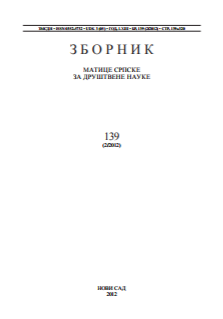УЛОГА РЕЛИГИЈЕ У ИДЕНТИТЕТУ ГРАЂАНА СРБИЈЕ: ИЗМЕЂУ ЛИЧНИХ ИЗБОРА И КОЛЕКТИВНИХ ПРЕДСТАВА СРПСКО СТАНОВНИШТВО СЈЕНИЦЕ И ПЕШТЕРА
THE ROLE OF THE RELIGION IN THE IDENTITY OF SERBIA’S CITIZENS BETWEEN PERSONAL CHOICES AND COLLECTIVE IMAGES: SERBIAN POPULATION OF SJENICA AND PEŠTER REGION
Author(s): Aleksandra PavićevićSubject(s): Christian Theology and Religion, Geography, Regional studies, Identity of Collectives
Published by: Матица српска
Keywords: religion; pluralism; militant secularism; Europe; Serbia; identity;
Summary/Abstract: In this paper, some aspects of current transitional processes in Serbian society are considered. In the public speech of Serbian political and intellectual elite, religion, religiosity and public and social engagement of religious institutions are emphasized as one of the key problems and obstacles for democratization processes. They are also observed as obstacle in creating multicultural and pluralistic society. In order to outline unsustainability of such an attitudes, in this article we analyze their bases: overlooking of dogmatic principles of certain religious systems and experiences of local religion communities; lack of insight in the real role that religion has in the life of individual and communities; implicit and militant secularism, which is applied as absolute model, without attempt to be adjusted to local cultural and historical specifics; politization of concept of pluralism which overview its basically philosophical and ontological nature. Real role of religion in the identity of Serbia’s citizens is shown through results of researching conducted among Serbian population in Sjenica and Pešter region. This article shows that in the democratization processes in Serbia, all relevant social, cultural and historical factors must be taken into consideration. It is also stretched that pluralistic society cannot be based at the negation of any community, institution or value system they are based on. Serbia’s citizen’s religiosity does not represent the obstacle for creating modern European state. The obstacles on this road, hidden behind different and imagined collective identities, lay in inability of the state administration to provide consistent legal system in which all citizens would enjoy equal protection.
Journal: Зборник Матице српске за друштвене науке
- Issue Year: 2012
- Issue No: 139
- Page Range: 159-172
- Page Count: 14
- Language: Serbian

